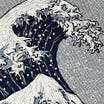Adam Kirsch, The Discarded Life. Red Hen Press, 2022.
Review by Brad Skow
First, a few insignificant events will vanish from your memory; later, inevitably, entire years will go. If this seems impossible to the young, Adam Kirsch has reached middle-age, and The Discarded Life aims, as it opens, to pin down the moments of his childhood and young adulthood that remain, and to figure their significance.
Those moments occupy a specific time and place, and one of the poems’ pleasures is how well they evoke that time and place. We are in Southern California, in the early 1980’s. (I grew up there in the same decade.) The Muppets, Atari games, and Sesame Street all make appearances, against the almost-imperceptible gradations of climate that that place calls “seasons”:
The most of winter that we ever knew
Was a gray, cloudy tincture of the air[.]For those who did not live through it, the technology available then must now seem insanely primitive. Kirsch mentions a computer game he would play, whose “dungeon” was
All that the bulky monochrome display
Could generate from five-inch floppy disks
You had to keep inserting and withdrawing,
Like turning hand cranks on an early Ford.At the time, all Americans worried about nuclear war. Southern Californians had more important disasters heading their way. I myself remember the regular drills, but not whether they were preparation for earthquakes, wildfires, or a meltdown at the local nuclear power plant. Kirsch describes a fire coming to his summer camp:
...red smoke drifted close enough to make
Our eyes burn like the chaparral around us,and I don’t think I’ve heard the word “chaparral” since I moved away.
Kirsch writes in blank verse, and shows by example that a wide range of rhythms can fit inside the iambic line. Take a look at these:
And night drives on such unfamiliar streets
[...]would be flattened out
To a featureless memento of brute force?
Their thin trunks and attenuated fronds[.]All have strong accents on the third syllable without a prior pause (“second-foot inversions”), which grade-school primers on iambic pentameter say is a no-no, but is actually perfectly fine, and quite expressive. Also notable is that Kirsch rarely enjambs his lines. Writing iambic pentameter is hard enough; it’s all the harder to write so that a phrase ends every ten or eleven syllables.
Because Kirsch’s meter tends to strictness, the looser moments can contribute powerful rhetorical effects. After the first Gulf War, when a “kid who’d taken French with us” returns to
[...] tell us how
It felt to sit inside a desert tank,
Waiting for the order to advance:the description is brief, its brevity made all the more meaningful by being a strong monosyllable fronting a headless line (that is, one missing a first, weak syllable):
Hot. If there was something more to say,
He didn’t think we were prepared to hear it.Burnishing the sights and sounds of a specific time and place, and embedding them in poetic amber, is a worthy enough artistic enterprise; but for Kirsch these are a means to something more ambitious. In most of the poems there is a turning to the abstract, and a reaching for some moral or epiphany. Now when a poem expresses some insight, the poem’s quality depends on how well it’s done: do the lines hit hard? These poems contain their share of trite conclusions, blandly stated:
Good is what we have to seem to be,
Not something anybody ever is.But they also make their share of observations that are surprising despite being obvious, as when a student at Kirsch’s school dies, and
...Later on,
A patch of garden named for Julian
Was planted in the schoolyard, with a plaque
That meant a little less with every year.The best-developed metaphors in the book are about smoking:
...I learned to hold a cigarette
With the same fingers that could take a pen
And flick the words like ashes down the page,
Leaving a record of the life consumed.Another expresses the indifference to the dangers of smoking that is the privilege of youth:
The thought that every cigarette I smoked
Subtracted minutes—eight or ten, I’d heard—
From the tall, toppling stack of time I owned
Could not discourage me [...]
To lose all this, and still have more to lose!
Who wouldn’t trade the ash-end of existence
For the controlled burn of a summer night [...]To lose all this, and still have more to lose.
The worst poem is number 38, which suggests that children are born only “to gratify [their] parents’ urge to love,” and that it might be better “To leave the child beneath the throne of God, / Unembodied and unhurtable”: an off-putting sentiment. The best is number 16, which suggests that all those duck-and-cover earthquake drills
Were less like preparation than appeasement,
As though the Big One would be satisfied
By all these recognitions of its power
And not be tempted to a demonstration.A final turn occurs at book’s end, when what seemed all along to be an exercise in holding on is revealed to be the opposite:
Poetry is a method of disposal,
Giving a decent burial in words
To the discarded life I have no use for—
Or else a way to throw it overboard
As the balloon jerks higher toward the sun.Brad Skow is a poet and a Professor of Philosophy at MIT. He writes the newsletter Mostly Aesthetics.





